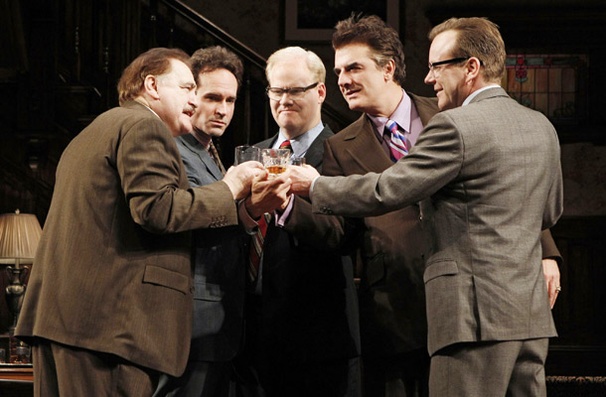“She was able to tap into the reserve of anger that fuels every comedian, high or low.”
Stephen Sondheim (on Ethel Merman), Finishing the Hat
TT: Snapshot
Johnny Cash and the Tennessee Two perform “I Walk the Line” on The Tex Ritter Show in 1955:
(This is the latest in a weekly series of arts-related videos that appear in this space each Wednesday.)
TT: Almanac
“I love wordplay, but when there’s nothing behind it, when its function is to prolong a tiny idea, it becomes masturbatory.”
Stephen Sondheim, Finishing the Hat
TT: The way we were (and weren’t)
In today’s Wall Street Journal I review the first Broadway revival of Jason Miller’s That Championship Season, which is awful (the play, that is, not the production). Here’s an excerpt.
* * *
Good or bad, every work of art is a time capsule, and sometimes it’s the worst ones that contain the most information about what the world was like when they were new. In the ’70s American playgoers rushed to embrace Jason Miller’s “That Championship Season” as a masterpiece of hard-hitting truth-telling. It ran for 944 performances, won a Pulitzer and was turned into a movie that starred Robert Mitchum. Today “That Championship Season,” which is now being revived on Broadway for the first time, looks like what it is, a quasi-political cartoon whose smugness stinks like dime-store perfume. Even so, I doubt that any other play that opened on Broadway in 1972 has more to tell us about the self-satisfied attitudes of the generation that made it a hit.
 Miller, an actor-turned-playwright who is remembered (if at all) for having played the priest in “The Exorcist,” apparently wrote “That Championship Season” to exorcise what he regarded as the collective sins of those Americans who, like him, grew up in the benighted Age of Eisenhower. The play’s five characters are residents of a city indistinguishable from Scranton, the medium-sized Pennsylvania town where Mr. Miller grew up. In youth four of them played together on a high-school basketball team whose coach (Brian Cox) is hosting a reunion dinner at his home. The men seem friendly, but appearances are deceiving, for Phil (Chris Noth) has had an affair with the wife of George (Jim Gaffigan), the mayor of the town where the play is set, and is secretly planning to throw his financial support behind another candidate in the next election….
Miller, an actor-turned-playwright who is remembered (if at all) for having played the priest in “The Exorcist,” apparently wrote “That Championship Season” to exorcise what he regarded as the collective sins of those Americans who, like him, grew up in the benighted Age of Eisenhower. The play’s five characters are residents of a city indistinguishable from Scranton, the medium-sized Pennsylvania town where Mr. Miller grew up. In youth four of them played together on a high-school basketball team whose coach (Brian Cox) is hosting a reunion dinner at his home. The men seem friendly, but appearances are deceiving, for Phil (Chris Noth) has had an affair with the wife of George (Jim Gaffigan), the mayor of the town where the play is set, and is secretly planning to throw his financial support behind another candidate in the next election….
I won’t say that a better playwright might not have been able to make something watchable out of this clichéd scenario, but what Mr. Miller made out of it in 1972 was pretty much what you’d have expected from a second-rate writer born in 1939 who had drunk deep from the well of the ’60s and now proposed to inform his audiences that their parents’ values were comprehensively corrupt. Hence the coach, a boorish, ill-educated stage-Irish blowhard who proudly displays pictures of Teddy Roosevelt, John Kennedy and Fightin’ Joe McCarthy on his mantelpiece and salts his small talk with good old-fashioned ethnic slurs of the highest possible voltage, thereby alerting the audience to his lack of enlightenment….
Were there really people like the coach? Certainly, and plenty of them, too–but the ludicrous lack of subtlety with which Miller portrays this one kills “That Championship Season” stone dead. Every five pages or so, the action, such as it is, comes to a halt so that he can deliver a sermonette crammed full of his personal prejudices…
* * *
Read the whole thing here.
TT: Almanac
“Poets tend to be poor lyricists because their verse has its own inner music and doesn’t make allowance for the real thing.”
Stephen Sondheim, Finishing the Hat
TT: Countdown
My latest stint as a visiting scholar at Rollins College’s Winter Park Institute ends on Friday, after which I return to New York and resume my regular life. Not surprisingly, my schedule in Florida has grown more and more hectic in recent days, so much so that simply to write about it makes my head sizzle.
 Among other things, I drove down to Palm Beach twice. On my first visit, I (A) took part in the world premiere of Steven Caras: See Them Dance and (B) spoke about and signed copies of Pops: A Life of Louis Armstrong at a breakfast that got written up in the local paper. A week later I went back to cover the opening of the regional premiere of Michael Hollinger’s Ghost-Writer. In between these two visits, I flew up to New York to see two Broadway shows and present a literary award on behalf of Barnes & Noble.
Among other things, I drove down to Palm Beach twice. On my first visit, I (A) took part in the world premiere of Steven Caras: See Them Dance and (B) spoke about and signed copies of Pops: A Life of Louis Armstrong at a breakfast that got written up in the local paper. A week later I went back to cover the opening of the regional premiere of Michael Hollinger’s Ghost-Writer. In between these two visits, I flew up to New York to see two Broadway shows and present a literary award on behalf of Barnes & Noble.
Here’s part of the official account of the latter occasion:
Barnes & Noble Inc., the world’s largest bookseller, today announced that Canadian Kim Echlin’s nostalgic novel of a cross-cultural love story, The Disappeared (Black Cat), and attorney David R. Dow’s spellbinding account of his efforts to defend the seemingly indefensible, The Autobiography of an Execution (Twelve), have been named the winners of the 2010 Discover Awards for fiction and non-fiction, respectively. Each writer was awarded a cash prize of $10,000, and a full year of marketing and merchandising support from the bookseller….
The non-fiction winner, The Autobiography of an Execution, is David R. Dow’s thrilling account of his efforts to give death row inmates a proper defense in a criminal justice system gone awry. Non-fiction jurist Terry Teachout said, “No matter how you feel about capital punishment–and especially if you support it, whether staunchly or uneasily–this book will bring you face to face with the arbitrary, often capricious way in which the death penalty really works. It’s the most sobering book that I read in 2010.”
Writers on the non-fiction jury panel included Eric Blehm, whose book, The Last Season, won the Discover Award in 2006; British journalist Christina Lamb, whose book, The Sewing Circles of Herat: A Personal Voyage Through Afghanistan, was a finalist for the Discover Award in 2002; and critic Terry Teachout, whose biographies include The Skeptic: A Life of H.L. Mencken and Pops: A Life of Louis Armstrong.
The Discover Awards honor the works of exceptionally talented writers featured in the Barnes & Noble “Discover Great New Writers” program during the previous calendar year. In 2010, the Discover Great New Writers program featured the work of 60 previously unknown fiction and non-fiction writers….
I gave the prize to Dow at a luncheon ceremony on Wednesday and said a few heartfelt words about his book, which I once again commend to your attention.
 From there I flew back down to Winter Park to attend a salon at which David Behrman, Diana Cooper, and Victoria Redel, the three master artists currently in residence at the Atlantic Center for the Arts, discussed their work with a group of local supporters of the center, which is the best-run and most handsomely designed artists’ colony imaginable. I paid a brief visit there last month, which had the effect of making me want to go back as soon as possible. (Small-world story: Behrman turns out to be the son of S.N. Behrman, the playwright whose work is a cause of mine. He was as surprised to learn that I knew who his father was as I was to learn that he was Sam Behrman’s son.)
From there I flew back down to Winter Park to attend a salon at which David Behrman, Diana Cooper, and Victoria Redel, the three master artists currently in residence at the Atlantic Center for the Arts, discussed their work with a group of local supporters of the center, which is the best-run and most handsomely designed artists’ colony imaginable. I paid a brief visit there last month, which had the effect of making me want to go back as soon as possible. (Small-world story: Behrman turns out to be the son of S.N. Behrman, the playwright whose work is a cause of mine. He was as surprised to learn that I knew who his father was as I was to learn that he was Sam Behrman’s son.)
 Next came my second trip to Palm Beach, after which I returned to Winter Park to write a review of one of the shows I’d seen on Broadway (it’ll be in Tuesday’s Wall Street Journal) and hear a performance of Bach’s St. John Passion given by the Bach Festival Society that was conducted by my old friend John Sinclair. Having just spent a week hurtling from place to place, it was a comfort to sit in Rollins College’s Knowles Memorial Chapel, one of the most tranquil spaces that I know, and listen to profoundly spiritual music that says what it has to say without wasting a note.
Next came my second trip to Palm Beach, after which I returned to Winter Park to write a review of one of the shows I’d seen on Broadway (it’ll be in Tuesday’s Wall Street Journal) and hear a performance of Bach’s St. John Passion given by the Bach Festival Society that was conducted by my old friend John Sinclair. Having just spent a week hurtling from place to place, it was a comfort to sit in Rollins College’s Knowles Memorial Chapel, one of the most tranquil spaces that I know, and listen to profoundly spiritual music that says what it has to say without wasting a note.
Now my work in Florida is done, and all that remains for Mrs. T and me to do is pack our bags and say goodbye to our new friends. Have we missed New York? Sure. In fact, we’ve been on the move so steadily since mid-December that we haven’t even had time to buy furniture for our new Manhattan apartment, much less to hang any of the pieces in the Teachout Museum. I long to explore our new neighborhood, and I want very much to see all my old friends in New York.
That said, I also know that come Friday night, I’ll be missing Winter Park, too. Aside from the straightforward and uncomplicated affection that I feel for the place and its people, I’m astonished by the amount of work that I’ve been able to get done on Danse Russe, Satchmo at the Waldorf, and my Duke Ellington biography since I arrived here in January. New York, they say, is the most stimulating of cities, but I find there’s at least as much to be said for the beneficial effects of setting up shop in a smaller, quieter place where the pace is slower and the overall frenzy level significantly lower (though not in the past couple of weeks!).
In 1991 I wrote a book in which I asked the following question: “When do we acquire the grace to feel at home where we are?” Home, needless to say, is wherever Mrs. T is, but otherwise…well, I’m still working on that one twenty years later.
TT: Just because
An extremely rare kinescope of film noir actress Lizabeth Scott singing “He Is a Man” on TV in 1958:
TT: Almanac
“One of the jobs of poetry is to make the unbearable bearable, not by falsehood but by clear, precise confrontation.”
Richard Wilbur, interview, The Paris Review, Winter 1977
